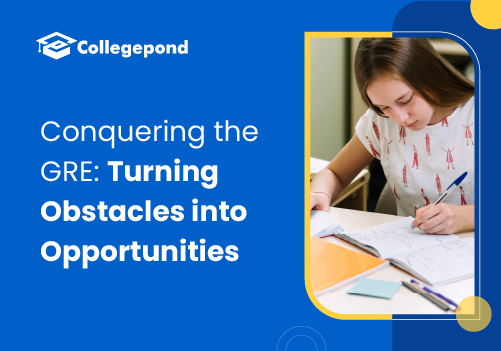
Conquering the GRE: Turning Obstacles into Opportunities
This article features expert advice from Jimeet Sanghavi, Co-founder, Director, and Head Counselor at Collegepond
In India, pursuing higher education typically involves clearing high-stakes entrance exams. Whether it’s cracking the CAT for an MBA, acing the UPSC for civil services, or excelling in GATE for an MTech, students have a clear and crucial goal: to pass these exams. Failure to do so can result in losing an entire year. But for those looking to study abroad, the journey can seem more complex. Instead of focusing solely on a single exam, the emphasis shifts to building a holistic profile, including papers, projects, internships, and work experience. This broader approach can sometimes lead students to underestimate the importance of exams like the GRE.
This article aims to demystify the role of the GRE in the application process and explain why it might be more crucial than many students realize.
Let's Compare the Two Scenarios
In India, students are intensely focused on entrance exams, knowing that failure can mean losing a year. The choices seem limited to pursuing an MBA, an MTech, preparing for the UPSC, entering the job market, or joining the family business. In contrast, students studying abroad face a more complex set of decisions. They have to determine which course and country to choose and when to apply. The emphasis on building a strong profile often overshadows preparation for standardized tests like the GRE. As a result, the average GRE scores among Indian students have declined post-COVID due to this scattered focus.
Will the GRE Matter?
Why has the GRE become so critical? It’s because, much like the entrance exams in India where the exam itself determines your fate, many top universities abroad use the GRE to make initial decisions. With the sheer volume of applications these institutions receive, they rely heavily on standardized test scores to narrow down candidates. Many top universities have GRE cut-offs; if your score is below this threshold, your application might be automatically rejected, regardless of how strong your profile is. This practice is especially prevalent in competitive programs. While building a strong profile is essential and should be your focus after clearing this first hurdle, the GRE often becomes an overlooked but crucial step in the admissions process.
If you think the GRE doesn’t matter for admissions, consider these additional areas where it can be significant:
- Loan Benefits: A higher GRE score can lead to reduced interest rates on educational loans. Loan vendors view a high GRE score as an indicator of a bright and capable student, which lowers their perception of financial risk. This is because a strong GRE score suggests that you are more likely to succeed academically and professionally, thereby improving your chances of repaying the loan. If you focus solely on profile building and neglect the GRE, you might miss out on these potential financial benefits.
- Scholarships: Some universities may accept you without a GRE score, but for scholarships, a GRE score is often required. Even if your parents are funding your education, not paying attention to the GRE might mean missing out on valuable financial support.
If you’ve seen the Dark Knight movies, you’ll remember that Christian Bale’s character was only able to make the jump when he let go of the harness —as if his life depended on that jump. Similarly, unless you approach the GRE with the same level of dedication and focus as a student from Kota preparing for an IIT exam or a UPSC aspirant who prioritizes their exam prep above everything else, you may not succeed in achieving the score you need.
The Role of GRE Scores, Profile, and Essays in University Admissions
Now, you may ask, “But then I haven’t focused on profile building—I might not get into top universities.”
Here’s where you’re mistaken. When we examine the profiles of students who have gained admission to top universities, we find that most of them first clear critical hurdles such as the CGPA or GRE cutoff. Typically, a student with higher grades and an average profile is more likely to get into a prestigious university compared to someone with lower grades but a stronger profile.
That said, putting your best foot forward through your essays is crucial. While a strong academic profile and GRE score are essential for getting your application noticed, how you present yourself in these essays—such as your Statement of Purpose (SOP), personal statement, and any other written components that showcase your experiences, goals, and motivations—can significantly influence the admissions decision. For instance, we’ve successfully helped students gain admission to Stanford and Harvard, even though they didn’t have paper publications, due to their well-crafted essays.
(Note: This discussion focuses solely on the admissions process. Long-term success or securing high-paying jobs involves different factors, including skill sets. Interestingly, research has shown that a GRE score of 315+ is strongly correlated with a 95% chance of getting a job before graduation, highlighting the importance of the right aptitude skills.)
Timing is Crucial
Before COVID, when every university required the GRE, it was the first thing students focused on. That dedicated focus helped many students ace the exam. Now students are chasing after Coursera courses and other side projects that barely impact their admission chances.
So, now the question is: Is the GRE a curse, or can it be a real game-changer?
The GRE becomes a curse if you realize too late that it’s important. It’s like the saying, “A right decision made at the wrong time might not be the right decision.” If you’re rushing to meet deadlines and only focusing on the GRE while letting other tasks like applications and TOEFL slide, you might end up with a low score. And if you don’t have time to retake the GRE, you’ll be stuck applying to schools that don’t require it, which is like not taking the GRE at all. If you get on top of the GRE early, it can be a huge asset. But if you wait too long and don’t prep properly, it might just end up being a hurdle you created for yourself.
Let's break this down with some examples and case studies.
Imagine you’re considering two universities: University A, which requires the GRE, and University B, which is GRE-optional. Assuming all other factors—like your academic record, experiences, and recommendations—are identical, the timing and presence of your GRE score can make a significant difference.
Example 1: You apply to University B in October without taking the GRE. Since University B doesn’t require the GRE, your application is evaluated based on your profile alone. If you apply early, you’re ahead in the admissions queue, which could increase your chances of acceptance.
Example 2: You take the GRE in August or September but receive a low score. You decide to apply to University B in November or December, without retaking the GRE, and focus only on University B. Because your application is submitted later, and without an additional GRE score to boost it, your chances are reduced. So logically applying late, can be a big disadvantage.
So, who has a better chance of getting in? Applying in September or October to University B (without GRE) will definitely boost your chances over applying in November or December without a strong GRE score. The difference can be substantial—over 50% in some cases—because earlier applications often benefit from less competition and higher chances of securing a spot.
Alternative Scenario: Let’s say you took the GRE and did well, but you only applied to University A and University B just before the deadlines. While having a high GRE score is advantageous, applying late can still hurt your chances. Universities often have rolling admissions or may fill up spots early, so applying late—even with a good GRE score—can put you at a disadvantage compared to those who applied earlier.
Time Investment and Real-World Examples
When working professionals ask for advice on GRE prep, I usually say, “Consider taking a break from work.” It’s tough to balance a demanding 9-to-9 job with serious GRE study. It’s a bit like a doctor advising against drinking and smoking—good advice, but not always followed. Many aspirants find that the immediate benefit of keeping their salary for a few months outweighs the potential $20,000 scholarship. This “bird in the hand is worth two in the bush” mindset often leads to being “penny wise, pound foolish.”
Now, consider how much time students spend debating whether to take the GRE, checking which universities have waived it, and discussing it with peers and seniors. They might also be scouring Reddit, Quora, or emailing universities to figure out if the GRE is crucial. If you add up all that “wasted” time and instead focused on GRE prep, you’d probably cover about 40% of the syllabus. Before COVID, when the GRE was mandatory, students zeroed in on their prep without all this extra research.
To wrap it up, from working with hundreds of students each month, I’ve seen how the GRE can become a major stressor. The key to turning it into an advantage is to recognize its importance early and dedicate yourself to it fully. When should you start? My advice is “tomorrow,” because your GRE score is valid for five years. Don’t let the GRE be a stumbling block—turn it into a strength by prioritizing it now.




